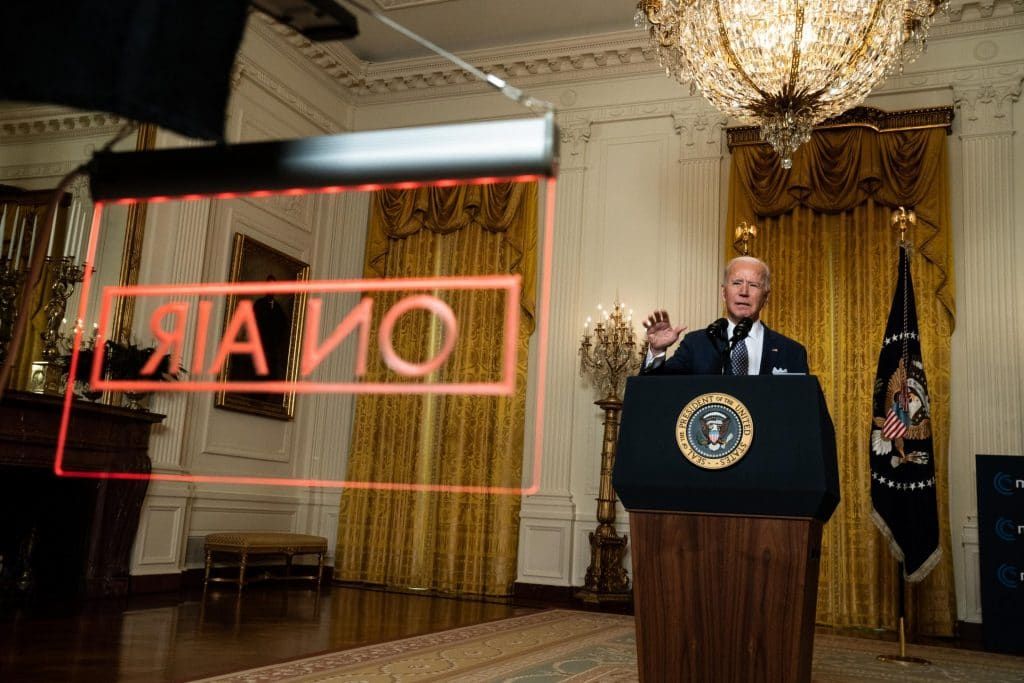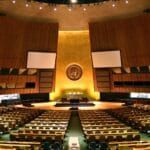Foreign commercial banks: The essential partner in future discussions of the Iran nuclear deal
By Christopher A. Bidwell | February 19, 2021
 President Biden delivers remarks to the virtual Munich Security Conference. Photo by Anna Moneymaker-Pool/Getty Images
President Biden delivers remarks to the virtual Munich Security Conference. Photo by Anna Moneymaker-Pool/Getty Images
Serious discussions are occurring, especially in Washington, Tehran, and EU capitals, about a possible US return to the Iran nuclear deal otherwise known as the Joint Comprehensive Plan of Action (JCPOA), a possibility US President Joe Biden underscored in his Friday address to the Munich Security Conference. Before any serious discussions get underway, however, international commercial banking interests (not just government finance ministers) must be given an opportunity to provide substantive input—because, as a practical matter, these private enterprises will have the final say as to how much sanctions relief Iran effectively receives.
Under multiple US unilateral secondary sanction regimes—so called “business choice” sanctions— foreign commercial banks can do all the business they want to with Iranian entities, or with US entities, but not both. These business choice sanctions have an impact on decision-making by large non-US banks that is unmatched by other multilateral or UN based sanction regimes. Furthermore, they have both nuclear and non-nuclear justifications, making them difficult to differentiate and unwind.
The compliance by foreign banks with US unilateral business choice sanctions is all but assured as the US market (i.e. potential customer base) is several times bigger, more diversified, and more consequential, all by orders of magnitude, than the Iranian market. More important, these sanctions potentially constitute an existential risk threat to large European banks and insurance companies that simply can’t afford to be shut out from the US financial system and Wall Street. The fear is based on tangible enforcement history. Over the last 10 years, foreign banks with US operations that ignored US sanction laws and continued doing business with Iran received punishments that resulted in billions upon billions of dollars’ worth of fines and operating suspensions.
In one case, French-based BNP Paribas paid approximately $9 billion in sanctions fines to the US government and state and local entities, including the New York Attorney General and the New York’s State Banking Regulator. Still, that wasn’t the worst of the punishments. BNP Paribas was also suspended from conducting US dollar-clearing operations for a year and thereby lost key customers to their competitors. BNP Paribas was not alone in its sanctions misery. UK-based HSBC paid out almost $1.9 billion in fines. Others have paid hundreds of millions of dollars in fines both before and after the JCPOA went into effect. Despite being labeled “Iranian financial sanctions,” it is foreign banks and entities, not Iranian entities, that wind up paying the fines.
In 2015, post-JCPOA, most international banks concluded that it was still too risky to do business with Iran. Consequently, Iran received only nominal sanctions relief, and it could not get the substantive long-term foreign investments necessary to grow its economy. Even today, the Iranians have trouble getting underwriting support for food and medicine purchases expressly permitted under US laws. Additionally, international banks remain concerned about reputational risk involved in doing any transactions with Iran that could cause them to be shunned by other banks and companies that they want to do business with. Since 2015 the business-risk decisions of foreign commercial banks have effectively undermined the sanctions relief announced by JCPOA negotiators.
Also, in 2015, foreign banks had legitimate concerns as to what would happen if the JCPOA broke down, or parties walked away, before any new long-term investments paid off. Those fears were validated in 2018 when the Trump administration walked away from the JCPOA and began reinstating and expanding US unilateral sanctions.
Another concern foreign banks had in 2015: US unilateral business choice sanctions were never legally terminated. Their enforcement was simply suspended. Additionally, post-JCPOA, non-nuclear US unilateral sanctions—focused on Iran’s expanding ballistic missile program, its human rights violations, and its support for terrorist proxy organizations—remained in place. Just because the US declared it was no longer enforcing the nuclear-based sanctions did not mean that these other sanction regimes wouldn’t be enforced. From a foreign bank’s perspective, the message was clear: It was still too risky to do business with Iran. Workarounds, such as the INSTEX open banking channel and attempts by European governments to prohibit commercial banks from complying with US unilateral business choice sanctions have largely failed. As for US based banks, they are still largely prohibited from dealing with Iranian entities and have been for years.
Going forward, the question becomes: What type of sanctions relief would make private commercial financial institutions feel comfortable about investing in Iran and conducting business in Iranian markets? This is the most important question in any future negotiations, because European governments (and the US government, for that matter) cannot compel a commercial bank to do business with Iran if that bank makes a business risk decision to avoid Iranian markets. These banks will continue to have the option of saying “no” to potential transactions with Iran.
Iran’s approach going into any future negotiations could best be understood through the old adage “once bitten, twice shy.” What Iran learned in 2015 was that unless it can get comprehensive relief, there is no benefit in returning to the JCPOA or agreeing to any proposed new deal. Furthermore, support for proxy terrorist organizations and ballistic missile programs are seen by Iranian national security leaders as keys to their strategic depth. To give up those assets, they will certainly demand extremely substantive sanctions relief.
It is therefore highly likely that during future negotiations Iran will eventually ask private foreign bankers whether the terms of a proposed new deal will be attractive enough for them to invest in Iran. If a deal is to be had, the answer had better be a resounding “yes.” Consequently, hard-nosed, risk-sensitive commercial banking interests should have an early and prominent role in negotiations regarding any future deal with Iran.
Together, we make the world safer.
The Bulletin elevates expert voices above the noise. But as an independent nonprofit organization, our operations depend on the support of readers like you. Help us continue to deliver quality journalism that holds leaders accountable. Your support of our work at any level is important. In return, we promise our coverage will be understandable, influential, vigilant, solution-oriented, and fair-minded. Together we can make a difference.
















Throughout this article you refer to “Foreign” banks when, since I assume you are writing for an audience beyond the USA, you appear to mean non-US banks?